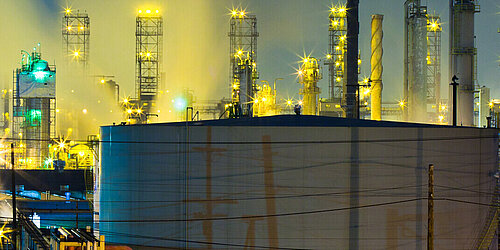Climate neutrality by 2045
The amended Federal Climate Change Act has defined 2045 as the year by which Germany must have achieved greenhouse gas neutrality. The Act has brought forward the climate-neutral deadline by five years. As such, Germany is making a key contribution to limit global heating to significantly less than two degrees Celsius and to achieving global greenhouse gas neutrality in the second half of this century.
The Climate Change Act sets out a framework for modernising the German economy, specifying both strategic principles and sector targets for all action areas (industry, energy, buildings, transport, agriculture, waste and others) to be addressed on the path towards climate neutrality. The Act therefore provides a clear perspective for investments to be made in industrial sectors in the years to come.
Greenhouse gas emissions in the industrial sector
In 2024, 24 percent of greenhouse gas emissions in Germany were attributable to industry. After energy, this makes industry the second-largest source of greenhouse gas emissions in Germany. At the same time, this sector occupies a key position within the German domestic and export economy. Accordingly, industry has an all-important role to play in achieving greenhouse gas neutrality.
Over the last 33 years, German industry has already taken significant climate action steps and has achieved considerable mitigations to greenhouse gas emissions. These reductions have been largely achieved by energy-efficient technologies and process optimisation, as well as the general reuse of waste heat. As a result, industrial emissions have decreased by around 45 percent between 1990 and 2024. This process has gone hand in hand with a significant increase in value creation.
Most of the emissions from manufacturing result from the production of basic materials: steel, chemicals, cement, lime, non-ferrous metals, glass, ceramics, pulp and paper, foundries and other energy-intensive industries.
Causes of greenhouse gas emissions from industry
In addition to energy-related greenhouse gas emissions, the industrial sector also generates process-related greenhouse gas emissions. This sector thus generates three different kinds of emissions:
- Direct energy-related greenhouse gas emissions result from the use of fuels to provide energy (for example process heat, steam, mechanical work).
- Indirect energy-related greenhouse gas emissions result from the generation of the electricity used (for exapmle from a coal-fired or natural gas-fired power plant).
- Process-related greenhouse gas emissions that do not originate from the use of fossil fuels and raw materials for energy generation, but are primarily caused by the technology-related or process-related use of these substances in the production process, as well as the process-related release of greenhouse gases other than carbon dioxide.
Process-related emissions in basic industry
Process-related greenhouse gas emissions in industry represent around 25 per cent of the total industrial emissions. The following sectors of basic industry account for a large part of the total industrial process-related greenhouse gas emissions in Germany:
- Metal production (production of iron, steel and aluminium)
- Manufacture of mineral products (cement, lime and glass)
- Production of basic chemicals (mainly ammonia, adipic acid and nitric acid)
Energy-intensive sectors
Energy-intensive sectors
What is decarbonisation?
Alongside other greenhouse gases, carbon dioxide (CO2) is a significant contributor to the greenhouse effect and therefore global warming. Decarbonisation is therefore an important step on the path to greenhouse gas neutrality. The term refers to achieving an ‘exit’ from carbon. In manufacturing, decarbonisation refers to a changeover to zero-carbon or carbon-neutral production processes.
Source:
UBA (2025): Daten der Treibhausgasemissionen des Jahres 2024 nach KSG.
